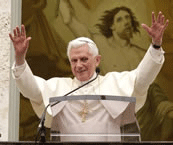ANGELUS
H.H. Benedict XVI
"On the Law of God"
September 2, 2012
www.zenit.org
Dear brothers and sisters!
In the Liturgy of the Word this Sunday the theme of God’s Law, of his commandment emerges. This is an essential element both in the Jewish and Christian religions. In the latter the Law of God finds its complete fulfillment in love (cf. Romans 13:10). God’s Law is his Word that guides man on his life’s journey, it leads him out of the slavery of egoism and brings him into the “land” of true freedom and life. For this reason in the Bible the Law is not seen as a burden, an oppressive limitation, but as a precious gift of the Lord, the witness of his paternal love, of his will to be near his people, of being their ally and writing a history of love with them. This is how the pious Israelite prays: “In your decrees is my delight, / I will not forget your word. (...) Lead me in the way of your commandments, / because in them is my happiness” (Psalms 119:16, 35). In the Old Testament, Moses is the one who transmits the Law to the people in God’s name. After the long journey in the desert, on the threshold of the Promised Land, Moses proclaimed: “Now, Israel, listen to the laws and precepts that I shall teach you that you might put them into practice so that you might live and enter into the possession of the land that the Lord, God of your fathers, is going to give you” (Deuteronomy 4:1).
And here is the problem: when the people establish themselves in the land and are the depository of the Law, they are tempted to place their certainty and their joy in something that is no longer the Word of the Lord: in possessions, in power, other “divinities” that are not in fact real, that are idols. Certainly the Law of God remains, but it is no longer the most important thing, the rule of life; it becomes rather a veneer, a shell, while life follows others paths, other rules, interests that are often the self-centered ones of the individual and group. And thus religion loses its authentic meaning, which is to live a life of listening to God to do his will – which is the truth of our being – and thus to live well, in true freedom. Religion is reduced to practices of secondary importance that satisfy the human need of feeling right with God. And this is a grave danger in every religion, which Jesus encountered in his time, but which, unfortunately, is also a phenomenon in Christianity. Thus, Jesus’ words against the scribes and Pharisees in today’s Gospel must make us think too. Jesus made the words of the prophet Isaiah his own: “This people honors me with their lips but their heart is far from me. In vain do they worship me, teaching doctrines that are the precepts of men” (Mark 7:6-7; cf. Isaiah 29:13). He then concludes: “Neglecting God’s commandment, you observe the traditions of men” (Mark 7:8).
Also in his Letter, the Apostle James warns against the danger of false religiosity. He writes to the Christians: “Be those who put the Word into practice and not only hearers of it, deceiving yourselves” (James 1:22). May the Virgin Mary, to whom we now turn in prayer, help us to listen with an open and sincere heart to the Word of God, so that it might direct our thoughts, choices, actions every day.
[Following the recitation of the Angelus, the Holy Father greeted those present in various languages. In English he said:]
I greet all the English-speaking pilgrims and visitors present for this Angelus. The Gospel of today’s liturgy spurs all of us to a greater harmony between the faith we treasure in our hearts and our outward behavior. By God’s grace, may we be purified inside and out, so as to live integrally our commitment to Christ and to his message. God bless all of you!
[Concluding in Italian, he said:]
Have a good Sunday everyone!
[Translation by Joseph G. Trabbic]
| H.H. Benedict XVI-Angelus |

